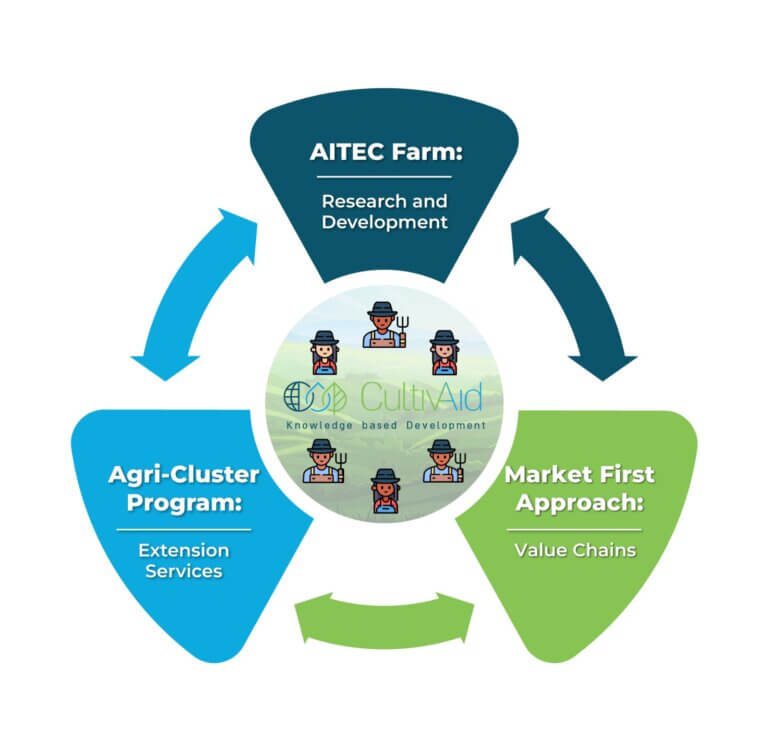CultivAid's Agricultural Helix
The agricultural helix is a conceptual framework that describes the dynamic relationship between agricultural research and development, agricultural extension and production, and Market development. This concept suggests that agricultural development is not linear but rather cyclical, influenced by various factors including technology, environmental factors, economic factors, and social dynamics.

Agricultural Innovation and Technology Center (AITEC) Farms
The Agricultural Innovation and Technology Centers operates as a central mechanism for agricultural development and for transferring technology and developing knowledge. The AITEC is a medium sided farm that enables regional access to improved agricultural inputs, mechanization, supply chains, access to knowledge and has impacts on value chains.
The farms are equipped with drip irrigation, sprinklers, greenhouses, seedling nursery, innovative technologies and apply advanced agro-techniques to demonstrate the potential Israeli technology has to offer. The sites are centers for trainings and facilitate the development of an agricultural knowledge infrastructure, training expert agronomists to lead the agricultural transformation.
The farm is a logistical Hub that promotes market linkages for value chain development. The hub serves to facilitate connections, collaboration and partnerships between local and international stakeholders. The hub ensures market access to agricultural inputs and technologies while simultaneously promoting post-harvest processing and export of local production.
For more Information visit https://aitecfarm.com/
Training and Internships Programs
CultivAid works to develop African Agronomists who can lead the Agricultural Transformation from within.
Our perspective is that there is no one solution for improving agricultural performance, but rather many actors and a variety of activities are required to transform an ecosystem for long term sustainable change. There is a need for both technical capacity (agricultural know-how and technical skills) and functional capacity (managerial and financial).
The transfer of technology must be accompanied by appropriate training programs that build capacity to enable wide scale adaptation. CultivAid provides a variety of basic and advanced agricultural training programs that emphasize hands on, practical work:
- AITEC Internship Program: This unique program places young agronomists on-site with International counterparts for a six-month period, allowing them to gain practical, hands-on training while supporting the scaling up of related activities.
- AITEC Attachment Program: A 8-12 week immersive practical study experience that provides participants with in-depth exposure to modern agricultural practices and technologies. https://aitecfarm.com/aitec-attachment
- Expert Training Program: These specialized trainings introduce extension agents and experts to a wide range of agricultural concepts and methodologies, including irrigation, fertigation, pest control, soil management, fruit tree cultivation,.
CultivAid's Agri Cluster Program
The Agri Cluster Approach is a cornerstone of CultivAid’s strategy to improve the productivity of farmers. At its core, we leverage farmer organization and economies of scale to enable supply chain connectivity, hands on agricultural education and extension.
The Agri Cluster Program aims to bridge the gap between agricultural research and farmer production. By disseminating agricultural knowledge, information, and best practices directly to farmers, extension services ensure that the latest research findings, technical assistance, training, and advisory services are accessible to those who need them the most, farmers. CultivAid’s team of local agricultural professionals provides these extension services through hands-on demonstration sites and continuous training programs.
The Agri Agent is a trusted member of the farming community who acts as the crucial link between farmers and CultivAid. This individual serves as the primary point of contact for ordering agricultural inputs, coordinating technical support and training, and facilitating improved market access. Through the cluster approach, these agents are identified and empowered, enabling CultivAid to reach thousands of farmers and create a significant impact across the entire agricultural system.
Market First Approach
At the foundation of the Agricultural Helix is a Market First Approach, a model where market demand defines what crops to grow, which interventions are required, and the nature of research to be pursued.
Rather than viewing markets as the final step in agricultural development, CultivAid places them at the starting line. We begin by identifying specific buyer needs, across quality, volume, timing, and standards and then design the entire Helix to align with those requirements.
This approach begins with engagement with downstream actors: processors, aggregators, retailers, and exporters. These stakeholders articulate real-world specifications, such as sugar content for grapes, varietal preference for vegetables, or certification standards for spices, which in turn guide our research agendas, agronomic practices, and extension systems.
At the heart of this model is market integration and contractualization. With structured supply agreements and contract farming models, we link farmer clusters directly to buyers. These relationships are strengthened with incentive structures that reward quality, consistency, and reliability, reducing risk for both producers and buyers and promoting Market Stability.
